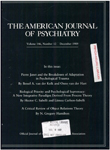Ineffectiveness of clonidine in the treatment of the benzodiazepine withdrawal syndrome: report of three cases
Abstract
The effectiveness of clonidine hydrochloride in the treatment of abrupt withdrawal from long-term, therapeutic doses of benzodiazepines was studied in three patients under double-blind, placebo-controlled conditions. The intensity, severity, and duration of the abstinence syndrome were not altered by clonidine at a dose sufficient to markedly reduce blood pressure and plasma free 3-methoxy-4-hydroxyphenylglycol. These results contrast with the established efficacy of clonidine in the opiate withdrawal syndrome and suggest that many of the symptoms of benzodiazepine withdrawal may not be caused by hyperactivity of the noradrenergic system.
Access content
To read the fulltext, please use one of the options below to sign in or purchase access.- Personal login
- Institutional Login
- Sign in via OpenAthens
- Register for access
-
Please login/register if you wish to pair your device and check access availability.
Not a subscriber?
PsychiatryOnline subscription options offer access to the DSM-5 library, books, journals, CME, and patient resources. This all-in-one virtual library provides psychiatrists and mental health professionals with key resources for diagnosis, treatment, research, and professional development.
Need more help? PsychiatryOnline Customer Service may be reached by emailing [email protected] or by calling 800-368-5777 (in the U.S.) or 703-907-7322 (outside the U.S.).



